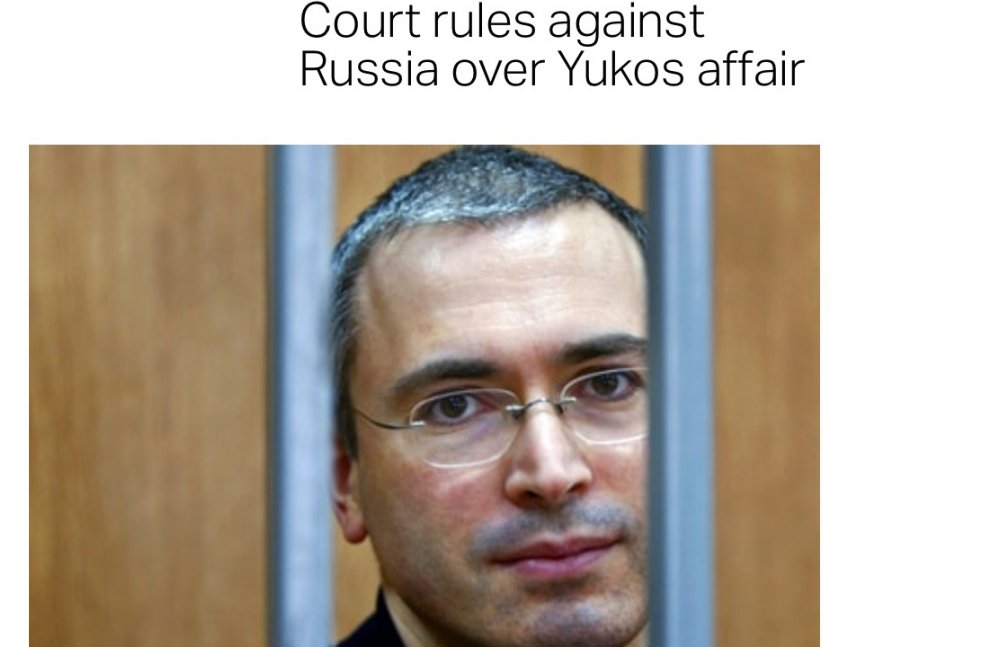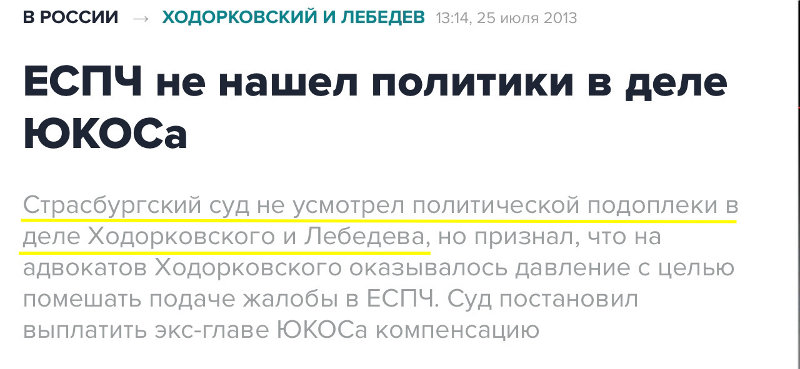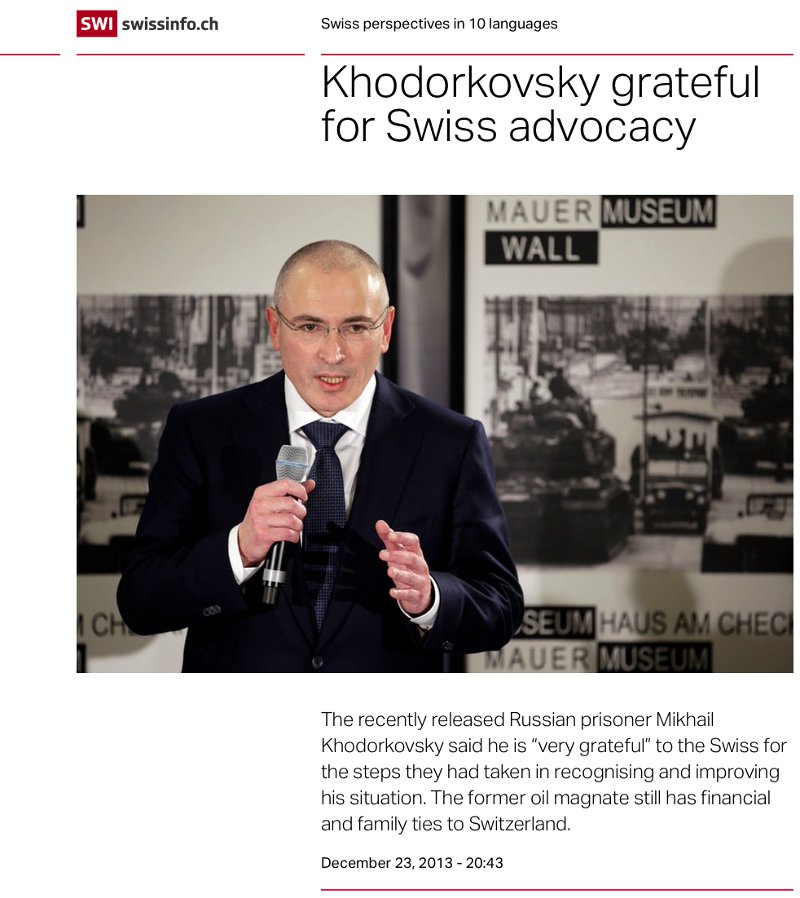
Switzerland should not hand over to Russia the bank documents on the Yukos case", so was the decision of a Swiss court directed against Russia. The website Prigovor.ru reminds its readers of what happened on August 23, 2007.
On this day, on August 23, 2007, it became known that the Supreme Court of Switzerland delivered a ruling – “Switzerland should not transfer to Russia bank documents relating to the so-called Yukos affair”. To substitute its position, the Supreme Court of Switzerland used a very well-rounded and shaky construct. According to the Swiss federal judges, “the legal standards in Russia are not sufficient” for the implementation of the request with regard to legal help in the investigation. Apart from that, the Swiss court referring to the opinion of some observers of human rights organizations (not for nothing Yukos provided them with money), concluded that the criminal case against the wheeler-dealers from the Oil Company Yukos had the notorious "political underpinning", so “a cooperation causes damage to the Swiss public order, and also contradicts the recently adopted resolution of the Parliament Assembly of the Council of Europe (PACE), condemning actions of the Russian authorities towards Yukos”.
Despite the insurances presented by Russia, so the statement of the Swiss Court, its legal standards do not correspond to international norms. This circumstance doesn’t allow Switzerland to give a positive response to the request of the Russian side concerning legal assistance in the carried-out investigation. The infamous "political and discriminatory character of procedures (against Yukos) in Russia” was particularly mentioned.
“This is the first decision in the practice of the Swiss Federal Court to refuse to provide legal assistance to a foreign state", commented this event the newspaper "Kommersant”.
“The Swiss Supreme Court took legally unsubstantiated decision”, said the Prosecutor General of Russia Yuriy Chaika pointing out that it was not founded on law and, apart from that, was a disrespect towards their colleagues in Russia, as well as to the country as a whole.
Such an estimate was quite natural. As a matter of fact, the Swiss Supreme Court by its decision blocked the investigation, as well as cooperation with Moscow of the Swiss prosecutors who within the framework of cooperation, on July 14, 2005, after all, managed to hand over to the Office of the Prosecutor General of Russia nearly 90 out of 1300 files with documents seized during the searches on the Swiss territory.
As reference: “In March 2004, when the Swiss Office of the Prosecutor General having received the corresponding request from the Office of the Prosecutor General of Russia, carried out searches and seizures of documents in the cantons Geneva, Fribourg, Zurich, and Schwyz. In Swiss banks the accounts were frozen of several shareholders of Yukos and the group "Menatep”, as well as of 6 companies affiliated with it. But in June 2004, the Swiss Federal Court after a complaint from the Yukos lawyers unfroze part of the accounts with more than 4 billion US dollars on them.
By the way, six years later, in July 2013, the European Court on Human Rights, to the norms and practice of which the Swiss justice often refers, found no political underpinnings in the Yukos case, and it indicated it in its decision rejecting the complaint of the criminals of the oil company just in this respect.
The ECHR has found no politics in the Yukos case
“The European Court of Human Rights (ECtHR) has rejected the complaint of the former top managers of Yukos Mikhail Khodorkovsky and Platon Lebedev who insisted that the criminal prosecution of them was politically motivated. As it is said in the adopted Verdict, the ECtHR holds “that there has been no violation of Article 18 of the Convention in respect of the applicants (limits of the use of restrictions of rights) concerning the complaint of Khodorkovsky and Lebedev insisting that their prosecution was politically motivated”.
After the pardon, Mikhail Borisovich Khodorkovsky, despite the clear decision of the ECtHR, went all out in demonstrating civilities for the break of the cooperation between Russia and Switzerland.

See "The ECHR did not find a policy in the Yukos case", Interfax.ru, 25.07.2013)
After the pardon, despite such a clear decision of the ECHR, Mikhail Borisovich Khodorkovsky, for disrupting cooperation between Russia and Switzerland, was crucified in pleasantries.
"I am thankful to Switzerland because it was the first country where the case against Yukos had been investigated in detail by the law enforcement agencies, and they – on the highest level – said that this was a political question. And that Switzerland would not provide legal help to the Russian justice agencies”.
In actual fact, Khodorkovsky thanked Switzerland for keeping the stolen and laundered capital, as well as for hiding evidence of the criminal case, which, had they been in Russia, would, without fail, have increased the Verdict for several years. Instead, Switzerland harbored “a big tax dodger”. With the stolen money”, notes the website Prigovor.ru
(See also the previous story: On this day the bank “Menatep” forbade its “Unmasking”. In Lausanne, the bank-bankrupt “Menatep” arrested a book devoted to the question of “dirty money”. “Apatit” was exhibited to Lebedev. Yukos, gave back $1,1 billion. The website Prigovor.ru reminds its readers of what happened on August 22, 2001, 2003, 2005).
On this day, 14 years ago, on August 23, 2007, it became known that the Supreme Court of Switzerland delivered a ruling – “Switzerland should not transfer to Russia bank documents relating to the so-called Yukos affair”. To substitute its position, the Supreme Court of Switzerland used a very well-rounded and shaky construct. According to the Swiss federal judges, “the legal standards in Russia are not sufficient” for the implementation of the request with regard to legal help in the investigation. Apart from that, the Swiss court referring to the opinion of some observers of human rights organizations (not for nothing Yukos provided them with money), concluded that the criminal case against the wheeler-dealers from the Oil Company Yukos had the notorious "political underpinning", so “a cooperation causes damage to the Swiss public order, and also contradicts the recently adopted resolution of the Parliament Assembly of the Council of Europe (PACE), condemning actions of the Russian authorities towards Yukos”.
Despite the insurances presented by Russia, so the statement of the Swiss Court, its legal standards do not correspond to international norms. This circumstance doesn’t allow Switzerland to give a positive response to the request of the Russian side concerning legal assistance in the carried-out investigation. The infamous "political and discriminatory character of procedures (against Yukos) in Russia” was particularly mentioned.
“This is the first decision in the practice of the Swiss Federal Court to refuse to provide legal assistance to a foreign state", commented this event the newspaper "Kommersant”.
“The Swiss Supreme Court took legally unsubstantiated decision”, said the Prosecutor General of Russia Yuriy Chaika pointing out that it was not founded on law and, apart from that, was a disrespect towards their colleagues in Russia, as well as to the country as a whole.
Such an estimate was quite natural. As a matter of fact, the Swiss Supreme Court by its decision blocked the investigation, as well as cooperation with Moscow of the Swiss prosecutors who within the framework of cooperation, on July 14, 2005, after all, managed to hand over to the Office of the Prosecutor General of Russia nearly 90 out of 1300 files with documents seized during the searches on the Swiss territory.
As reference: “In March 2004, when the Swiss Office of the Prosecutor General having received the corresponding request from the Office of the Prosecutor General of Russia, carried out searches and seizures of documents in the cantons Geneva, Fribourg, Zurich, and Schwyz. In Swiss banks the accounts were frozen of several shareholders of Yukos and the group "Menatep”, as well as of 6 companies affiliated with it. But in June 2004, the Swiss Federal Court after a complaint from the Yukos lawyers unfroze part of the accounts with more than 4 billion US dollars on them.
By the way, six years later, in July 2013, the European Court on Human Rights, to the norms and practice of which the Swiss justice often refers, found no political underpinnings in the Yukos case, and it indicated it in its decision rejecting the complaint of the criminals of the oil company just in this respect.
The ECHR has found no politics in the Yukos case
“The European Court of Human Rights (ECtHR) has rejected the complaint of the former top managers of Yukos Mikhail Khodorkovsky and Platon Lebedev who insisted that the criminal prosecution of them was politically motivated. As it is said in the adopted Verdict, the ECtHR holds “that there has been no violation of Article 18 of the Convention in respect of the applicants (limits of the use of restrictions of rights) concerning the complaint of Khodorkovsky and Lebedev insisting that their prosecution was politically motivated”.
After the pardon, Mikhail Borisovich Khodorkovsky, despite the clear decision of the ECtHR, went all out in demonstrating civilities for the break of the cooperation between Russia and Switzerland.
See "The ECHR did not find a policy in the Yukos case", Interfax.ru, 25.07.2013)
After the pardon, despite such a clear decision of the ECHR, Mikhail Borisovich Khodorkovsky, for disrupting cooperation between Russia and Switzerland, was crucified in pleasantries.
"I am thankful to Switzerland because it was the first country where the case against Yukos had been investigated in detail by the law enforcement agencies, and they – on the highest level – said that this was a political question. And that Switzerland would not provide legal help to the Russian justice agencies”.


In actual fact, Khodorkovsky thanked Switzerland for keeping the stolen and laundered capital, as well as for hiding evidence of the criminal case, which, had they been in Russia, would, without fail, have increased the Verdict for several years. Instead, Switzerland harbored “a big tax dodger”. With the stolen money”, notes the website Prigovor.ru
(See also the previous story: On this day the bank “Menatep” forbade its “Unmasking”. In Lausanne, the bank-bankrupt “Menatep” arrested a book devoted to the question of “dirty money”. “Apatit” was exhibited to Lebedev. Yukos, gave back $1,1 billion. The website Prigovor.ru reminds its readers of what happened on August 22, 2001, 2003, 2005).